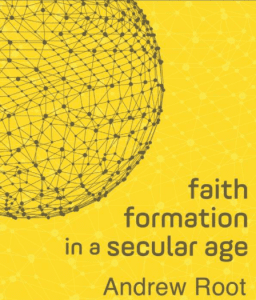 We are looking at one fascinating book: Faith Formation in a Secular Age, by Andrew Root. In the first half of the book he maps the age of obligation and duty giving way to the age of authenticity where authenticity is understood as being true to one’s own self. Inherent to authenticity’s supreme value is youthfulness, a category describing those who are seen as most relevant because they pursue authenticity.
We are looking at one fascinating book: Faith Formation in a Secular Age, by Andrew Root. In the first half of the book he maps the age of obligation and duty giving way to the age of authenticity where authenticity is understood as being true to one’s own self. Inherent to authenticity’s supreme value is youthfulness, a category describing those who are seen as most relevant because they pursue authenticity.
Root also sketches three kinds of Secular:
Secular 1: Sacred versus Secular Planes
Secular 2: Religious versus A-religious Spaces
Secular 3: The Negating of TranscendenceIn Secular 1 the zone for transcendence was a dual plane of the eternal and temporal. In Secular 2 the zone for the transcendent was reduced to spatial locales. Secular 2 locked transcendence in the religious space. In Secular 3 the zone for transcendence becomes negated. Now in front of the doorway into the transcendent are barriers with signs that read “closed” and “out of order.
All to set up what faith means for those caught in the age of authenticity and trapped into Secular 3. Remember, that Secular 3 values one’s experience as the path to authenticity, but not all experience is positive. Root likes the term “negation,” which is a kind of cruciformity.
Faith is to experience the encounter of Christ through the negation of the cross. Faith is not just an act of trust (this is to give it over to the immanence of Secular 3 and the battles of Secular 2). Rather, faith for Paul is something ever strange to our modern ears. Faith is actually to enter into Christ; it is to have our own being taken into the being of Jesus. Faith is to find our self bound to the faithfulness of Christ, who goes to the cross out of obedience to the Father.
Andrew Root then interprets Paul’s story through his pre-conversion zeal and then his conversion to negation.
He utilizes the work of Michael Gorman and this is what he focuses on: Paul’s former life was marked by zeal the kind of zeal found in Phinehas as stated in Numbers 25 and Psalm 106, though he could have connected these to 1 Macc 2:51-64. Phinehas was “reckoned righteous” for his zeal in taking the life of another out of commitment to the Torah and Israel’s purity.
Root then sees this through the lens of Secular 2 where faith is seen as radical commitment and action.
Then he turns to Paul’s conversion to Christ as the erasure and repenting from zeal to Christ and to a faith like Abraham’s (who was also “reckoned righteous” but for faith, not zeal), who was crucified, and this ties then into cruciformity/negation and to true life as ministry in union with others for the good of others.
If Phinehas is righteous through commitment that leads to the strongest of actions, then Abraham is righteous for the weak act of faith. If the spear is the weapon that wins Phinehas righteousness, then Abraham receives righteousness by faith. For Paul, faith becomes a unique category that stands in opposition to the forceful, committed action of his boyhood hero, Phinehas.
So following this thread, Paul sees that Abraham is righteous not because of his own action but rather because he seeks God in what is impossible, in and through the negation (the crucifixion) of his experience.
Abraham has faith because he suffers barrenness, facing the depths of weakness so that the act of God might come to him, ministering life out of negation. Abraham is righteous because he has embraced the gift of faith, not through committed action like Phinehas, but by embracing his negation and seeking a minister who can turn negation into new life.
Faith, then, in Secular 3 in the age of authenticity looks like this:
But while the age of authenticity endorses a naturalism that gives heft to the gravitational pull of Secular 3, it also creates cross-pressure not unlike Paul’s own. Authenticity makes experience essential, but this experience often hits the cold walls of negation. Secular 3 pulls a dirty trick; it tells people to feel, to dive deeply into their experiences (“for experience is all there after all,” whispers Secular 3). But following these experiences too deeply opens you to mystery or longing that moves you to see beyond the natural and material. Secular 3 then admonishes you for these experiences, negating them with doubt.
Union with others in love, that is in negation, is Secular 3 faith.











